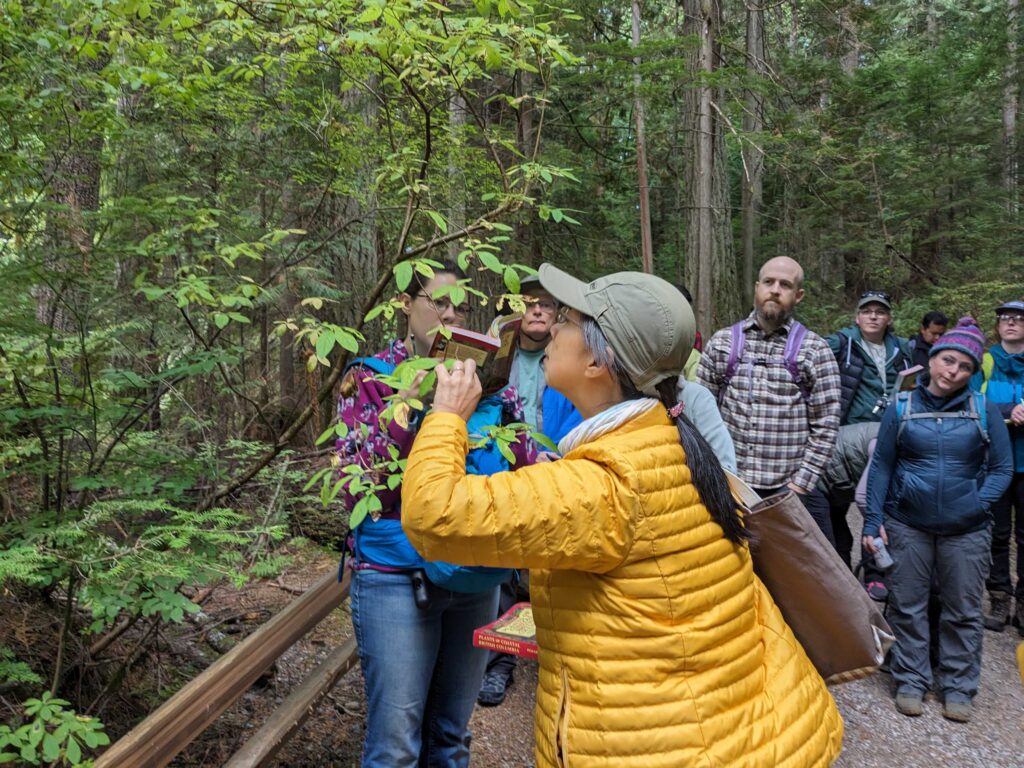** REGISTRATION FOR THIS CLASS IS NOW CLOSED – Please stay tuned for future classes**
Koma Kulshan / City of Bellingham – 2025 WNPS Stewardship Class
Rivers, Forests, and Shorelines of the Salish Sea Region
WNPS is pleased to support the 5th program in Stewardship and Restoration with the City of Bellingham in 2025. This course is open for application, with 25 new stewards in the making.
This no-cost course combines classroom learning with field trips to enrich understanding of the key roles that native plants play in our forests, rivers, shorelines, and other vital habitats, and shows how to use this knowledge to help protect and restore these habitats. The course provides 30 hours of learning including identification of important native and invasive plants, key wildlife-habitat relationships, restoration skills, and other topics. Home study of selected readings and videos supports classroom topics. In return, participants agree to provide 30 hours of service to local conservation and restoration projects within 18 months of completing the course.

Benefits: This program is part of the WNPS Native Plant Stewardship Program. Participants who complete the training will be recognized as a WNPS Native Plant Steward and will have the opportunity to become a Park Steward with the Bellingham Parks Volunteer Program.
What: Interested participants should apply to attend. Applications are due to be emailed to arcadianabe@yahoo.com by April 5th.
Apply using the Native Plant Stewardship Training Application document found in the Resources section at the bottom of this page.
When: This 6-week program meets in and around Bellingham
Classes: April 17 – May 22, 6:00 to 8:30 p.m. (Thursdays).
Field trips: April 26 & May 3rd, and 10th (Saturdays)
Mission Statement: To support a healthy community by providing high quality parks and recreation services.
Instructor: Abe Lloyd is an Adjunct Professor at WWU’s Huxley College of the Environment and long-time WNPS member. He grew up in Whatcom County and has been studying the region’s flora and fauna for nearly 30 years
T. Abe Lloyd, MSc; Koma Kulshan Chapter, Washington Native Plant Society
Cost: There is no tuition, but participants must be members of the Washington Native Plant Society. Cost for membership starts at $20. It’s easy to join! Visit http://www.wnps.org/join.html.
Meeting Location Fairhaven Park, Bloedel Donaovan Park, Multipurpose room. 2214 Electric Ave., Bellingham, WA 98229
Class Schedule
- Thursday, 4/17, 6:00-8:30pm – Class: Intro and course overview; Lowland forest habitats
- Thursday, 4/24, 6:00-8:30pm – Class: Riparian and Stream Ecology
- Saturday, 4/26, 8:30am-3:30pm – Field Trip: Stimpson Preserve and Edfro Creek
- Thursday, 5/1, 6:00-8:30pm – Class: Wetland Habitat, conservation and ecosystem services
- Saturday, 5/3, 8:30am-3:30pm – Field Trip: Tennant Lake and Larrabee State Park
- Thursday, 5/8, 6:00-8:30pm – Class: Nearshore ecosystems and invasive species
- Saturday, 5/10, 8:30am-3:30pm -Field Trip: City of Bellingham work party and restoration project overview
- Thursday, 5/15, 6:00-8:30pm – Class: Restoration ecology, birds, and Plants
- Thursday, 5/22, 6:00-8:30pm – Class: Plants and Pollinators, Graduation
Field Trips
Field trips are an integral part of the stewardship training that will complement and reinforce topics covered in class. Expect 5-8 hours of observation and hands-on activities in addition to travel time. Meeting times and places and trip logistics will be announced during class. Many of our field sites will have limited parking, so please plan on carpooling as much as possible. We will identify assembly areas where cars may be dropped and left for the day.
Field trips will focus on the following:
- Observing examples of natural plant communities, observing ecosystem processes, observing plant adaptations, and identification of key native and invasive plant species.
- Learning how to best us ID resources.
- Observing human impacts on ecosystems.
- Networking with local conservation organizations.
- Learning planting techniques, invasive species control, other restoration and management practices
- Learning how to run a restoration work party.
Field trips will run rain or shine, and stewards should come prepared for the conditions. Close-toed shoes (e.g. boots or tennis shoes) and long-sleeves are required for participation in the field trip work party. Make sure to bring lunch, and enough water and snacks for the day. A clipboard and paper, or field notebook are handy for keeping field notes.
Carpool etiquette: It’s WNPS policy for field trip passengers to share costs with carpool drivers. The cost-share should include consideration for wear and tear on vehicles as well as covering gas.
Recommended Guides
Plants of the Pacific Northwest Coast edited by Jim Pojar and Andy McKinnon. This guide includes excellent coverage of trees, shrubs, and wildflowers as well as other groups like grasses, ferns, mosses, and lichens. It has been the go-to field guide for almost 30 years for good reasons: 10 leading experts collaborated to write it and the species accounts are always interesting, and occasionally funny.
Natural History of the Pacific Northwest Mountains by Daniel Mathews. This is a wonderful book for at least two reasons. First, it includes all the common organisms from plants to birds and more, and second, the accounts are full of interesting tidbits that help you understand how the life in this region is greater than the sum of its parts.
Washington Wildflower App. This is a collaborative effort between the University of Washington Herbarium and Mark Turner, a local photographer and botanist. It includes great keys tools for quickly identifying plants
iNaturalist App. This free app produced by the California Academy of Sciences and National Geographic allows you to take advantage of computer learning to ID any living organism you photograph. If the computers can’t do it, a network of enthusiastic nature nerds usually can.
COURSE MATERIALS & RESOURCES:
